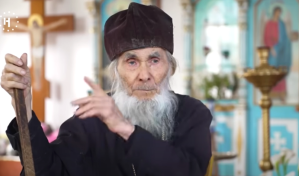
Russian authorities want an elderly archbishop to pay for the demolition of his own church building for “repeated crimes” after he criticized the invasion of Ukraine.
Officials charged the Rev. Viktor Pivovarov, 87-year-old leader of the Holy Intercession and Tikhon Church in Slavyansk-on-Kuban, in southern Krasnodar Region, with discrediting Russian armed forces after he labeled the invasion as “satanic.” His assistant, the Rev. Hieromonk Iona Sigida, suffered a beating by armed military figures in October.
Rights watchdog Forum 18 stated that the Slavyansk-na-Kubani city administration has filed a civil lawsuit against the archbishop, apparently in response to his stance against the invasion. Officials claim the independent Orthodox church built 25 years ago is an “unauthorized structure” and must be demolished at Pivovarov’s own expense, according to Forum 18.
These allegations first surfaced in December, when authorities began a criminal investigation of Pivovarov over his anti-war stance. The Slavyansk Inter-District Investigative Department told the city administration that the church building was “a public place where a crime has been repeatedly committed against the basis of the constitutional order and security of the Russian Federation.”
The department also alleged the building did not comply with planning regulations, and that therefore the administration had to “take measures to eliminate violations.”
The lawsuit claims that unauthorized structures on land plots are defined as “not designated for these purposes in the manner established by law, or without receiving the necessary permissions, or with significant violations of town-planning and building norms and rules.” Anyone constructing or allowing such a building has no ownership rights, and the structure must be demolished at the person’s own expense.
A court hearing for the civil suit is scheduled at Slavyansk City Court in Krasnodar Region on June 18, following an initial hearing before Judge Natalya Kovalchuk on May 23.
Forum 18 quoted the city administration saying the church was “a public place, with a large number of visitors, where a crime has been repeatedly committed against the basis of the constitutional order and security of the Russian Federation.”
If the court concurs with the administration’s suit, Pivovarov has 30 days to demolish the church structure after receiving written notice, not counting the outcome of any appeal allowed within one month.
The administration claims that holding any worship service within the building is misusing land intended only for “individual residential construction.”
Pivovarov has publicly accepted the risk of being killed or imprisoned for his public opposition to the invasion of Ukraine, saying it was “cursed by both God and man.” For lambasting Russia’s actions in the war he was ordered on April 8 to pay a fine of 150,000 Roubles ($1,679 USD) under Criminal Code Article 280.3, Part 1 (repeated “discreditation” of the Russian Armed Forces).
Forum 18’s questions to Russian authorities about the beating of Iona remain unanswered. Questions to the Administration of Slavyansk Urban Settlement about the demand for Pivovarov to pay for the demolition of the church building also drew no response.
The parish church website published a notice on May 27 saying the building had been inspected many times “with no claims made against us.” Church leaders called the allegations “ridiculous and godless.”
“It is clear that the reason for the decision to demolish our church is not formal violations, but only anger and revenge for the sermons and articles of Archbishop Viktor, for his confession of the truth of Christ, which they hate so much,” the statement read.
The investigative department first alerted the administration to “elimination of causes and conditions conducive to the commission of crimes” on Dec. 20. Senior Investigator Aleksey Ishchenko of the Investigative Department told administration head Aleksandr Bersenev about the archbishop being criminally charged for discrediting Russian forces, according to Forum 18.
Ishchenko said alleged offenses by Pivovarov happened “in a public place, namely, in the building of the Holy Intercession Tikhonite Church...foreseeing the inevitability of socially dangerous consequences in the form of destabilization of the socio-political situation, the exertion of influence on public opinion, the formation in society of a negative mood and disruption of trust in decisions taken by the Supreme Commander in Chief [and] state bodies of the Russian Federation.”
The investigative committee further noted that the church building, rather than being an “individual residential construction,” is actually “a public place, with a large number of visitors, where a crime has been repeatedly committed against the basis of the constitutional order and security of the Russian Federation.”
“This speaks of the improper execution of their professional obligations by employees of the department for municipal land control of the administration of Slavyansk-na-Kubani,” the committee added.
The city administration obeyed the investigator’s directive to inspect the site for compliance and “take immediate measures to eliminate violations and take disciplinary action against the perpetrators.”
Two members of the administration inspected the church building on March 29. The parish church in its May 27 statement expressed concern that the inspections were secret, reporting, “No one informed us of this or issued any warnings about violations or asked any questions.”
Pivovarov owns a private, red brick, two-story house and land at 130 Yunykh Kommunarov St. He also owns a second building of white brick on the plot used for worship meetings, which has an Orthodox cross on the roof.
Church members funded the site, and the first worship service took place in January 2000. Forum 18 stated that the church is not a religious organization registered with Russian authorities.





